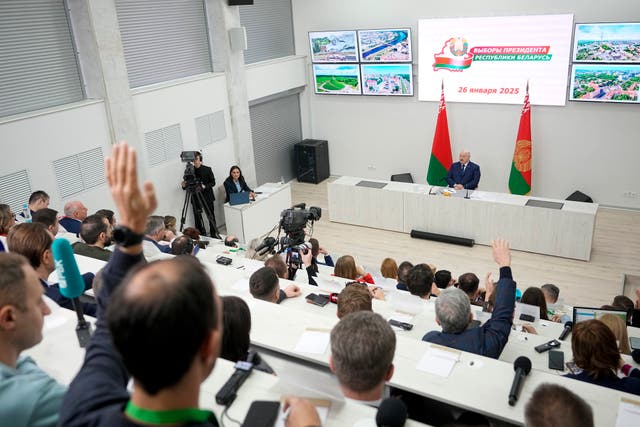Lukashenko extends rule after Belarus election rejected by opposition and EU
The authoritarian leader has been in power since 1994.

Belarus’ authoritarian President Alexander Lukashenko has extended his more than three decades in power after an orchestrated election that the opposition and the European Union rejected as a sham.
The country’s exiled opposition leader called the result “sheer nonsense”.
The Central Election Commission declared Mr Lukashenko the winner in the early hours of Monday and reaffirmed it later in the morning, saying the strongman leader garnered nearly 87% of the vote after a campaign in which four token challengers all praised his rule.
Mr Lukashenko’s opponents, many of whom are imprisoned or exiled abroad by his unrelenting crackdown on dissent and free speech, called the election a sham — much like the last one in 2020 that triggered months of protests that were unprecedented in the history of the country of nine million people.

The European Union has rejected Sunday’s election as illegitimate and threatened new sanctions.
German Foreign Minister Annalena Baerbock said the election offered no choice to voters, marking “a bitter day for all those who long for freedom and democracy”.
“Instead of free and fair elections and a life without fear and arbitrariness, they experience daily oppression, repression and human rights violations,” she said in a post on X.
The EU, the UK, Australia and New Zealand issued a joint statement condemning “the sham presidential elections in Belarus” and the Lukashenko government’s human rights violations.
“No election can be considered free, fair or in line with international standards when it is held in a climate of ongoing repression, marked by a clampdown on civil society, arbitrary detentions and restrictions on genuine political participation,” the statement said, urging authorities to release political prisoners.
The countries said they were imposing co-ordinated sanctions on Mr Lukashenko’s government. Britain and Canada jointly imposed sanctions on six individuals, including prison chiefs, a senior interior ministry official and the head of the Central Election Commission, as well as three Belarusian defence companies.

He relies on subsidies and political support from Russia.
Mr Lukashenko allowed Moscow to use the country’s territory to invade Ukraine in 2022 and later hosted some of Russia’s tactical nuclear weapons.
Russian president Vladimir Putin called Mr Lukashenko on Monday to congratulate him on his “convincing victory”, while Chinese President Xi Jinping also sent congratulations.
Opposition leader-in-exile Sviatlana Tsikhanouskaya, who fled Belarus under government pressure after challenging Mr Lukashenko in 2020, had denounced the election in advance and had urged voters to cross off every candidate on the ballot.
On Monday, she rejected the official vote tally as “sheer nonsense”, saying Mr Lukashenko “will not succeed in cheating the world and the Belarusian people, who live in fear amid the most horrible repressions”.
“As long as Belarus remains under control of Lukashenko and Putin, there will remain a constant threat to peace and security of the entire region,” Ms Tsikhanouskaya told The Associated Press.





